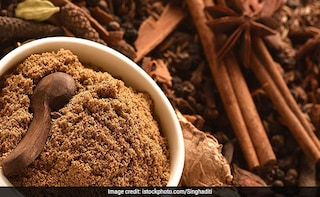Garam masala is the quintessential spice mix that is used in a number of vegetarian and non-vegetarian dishes. Garam masala contains a number of aromatic spices, which are ground in specific quantities and stored in air-tight containers to be used while cooking. You ask anyone what goes into making the spice mix, you're very likely to get a range of different recipes in response. There is no fixed recipe for making the garam masala, as every household prepares their own garam masala according to their taste and liking. Garam masala, other than enhancing the flavour of any dish, has several health benefits too. The health benefits of this spice mix is a sum total of the health benefits of the individual spices in the mix; the benefits vary in terms of the ratio of the mix and how much masala is used in daily cooking.
Some of the most common spices that feature in garam masala include cloves (laung), cinnamon (dalchini), cumin (jeera), nutmeg (jaiphal), peppercorn (kaali mirch), cardamom (elaichi) and bay leaves (tej patta).
Here Are The Health Benefits Of These Spices:
Clove (laung):
Clove has rich antioxidant-content that helps to remove toxins from our body. It also helps to boost our immunity. The eugenol present in clove helps ease digestion and also rev up metabolism naturally. It is also enriched with antiseptic, antiviral and antimicrobial properties. Here's an option if you want to buy cloves:
Cinnamon (dalchini):
Other than its rich aroma, cinnamon is prized for its exceptional medicinal properties. It is good for managing diabetes and slows the breakdown of carbohydrates in the digestive tract. It also helps fight bacterial and fungal infections. Here's an option for you:
Cumin (jeera):
Cumin is rich in anti-inflammatory, antioxidants properties and is also known to be antibacterial and antiseptic properties in it. It can solve a host of your tummy woes, fortify digestive tract, relieve nausea, and bloating and constipation. Including cumin in your diet may help in boosting your blood circulation. Here's an option for you:
Nutmeg (jaiphal):
Nutmeg contains many essential volatile oils such as myristicin, elemicin, eugenol and safrole. As per experts, the volatile oils have anti-inflammatory properties, which make it useful for treating muscle and joint pains. Nutmeg also has a calming effect when consumed in smaller doses. If you want to buy, you may consider this:
Peppercorn (kali mich):
Black pepper is antibacterial in nature, and therefore helps to cure cold and cough. Again, the piperine in black pepper eases digestion and stimulates the stomach, which then secretes more hydrochloric acid that helps to digest proteins in food. Here's an option for you:
Cardamon (elaichi):
Cardamom is packed with antioxidants. It is beneficial to cure cough and cold and also promotes good metabolism. Cardamom is also good for curing other stomach-related problems like indigestion, gas and constipation. Cardamom is rich in manganese which helps in controlling body's blood sugar levels. You may consider this while buying:
Bay leaves (tej patta):
Bay leaf is said to have strong effects on the gastrointestinal system. It decreases the toxicity of the body and further helps the body to function well. Organic compounds including caffeic acid and rutin that are found in bay leaves enhance our heart health. Here's an option for you:
